Few people in the world are as tapped into Latin music’s discography as Gia Fu, a Chinese DJ and producer from Hong Kong. To date, Gia’s career has been impressive, from throwing salsa parties in Hong Kong and headlining some in New York, to producing a big band album with Angel Meléndez, playing a party during the 2022 Latin Grammys, and signing with Marc Anthony’s talent agency.
How does she make this all happen while living on the other side of the world? Gia’s online presence is everything. She has played numerous guest sets on My Analog Journal, runs her own YouTube channel Mild Mambo Club, and shares her research on Instagram, all while maintaining a strategic hot-girl persona. Part of Gia’s success is in knowing how to make the digital world work for her.
“If I only posted record covers, nobody would give a f*ck about what I write. I know how to post a good photo and catch peoples’ attention, but the reality is that I’m mostly just in my studio studying and reading books.”
Gia’s love for Latin music dates back to her childhood. She grew up dancing mambo and cha-cha-cha under the direction of her mother, a dance teacher who taught ballroom-style in Shanghai, Beijing, and Hong Kong. But it wasn’t until high school, when Gia found herself at a breakdancing party, that she heard her first salsa record. “My friends would go to these breakdancing battles in Hong Kong. It was all local kids and nobody spoke Spanish, but the DJ suddenly played ‘Que Se Sepa’ by Roberto Roena. The whole crowd started singing along ‘si si, si do re do si do do,’ and when the beat dropped everyone went crazy. I was like, ‘What is this? I need to know more about this music.’”
(Breakdancing and Latin culture are closely linked. Roberto Roena, dancer, frontman of Roberto Roena y Su Apollo Sound, and percussionist for El Gran Combo de Puerto Rico, can be seen breakdancing in this 1973 performance with Fania All Stars.)
For over ten years, Gia has been obsessively collecting and cataloging Latin music, taking multiple tours to the United States in search of rare records, many of which don’t exist online. But she’s after more than just a DJ career. “I didn’t start DJing because I wanted to be a DJ. I do it so that I can learn everything I can about the music. I don’t want to just be pressing play. I want to know all the salsa in the world.”
Gia’s commitment to salsa music extends far and wide. She’s interested in understanding Latin music’s historical influences on Asia and vice versa, from the stories behind Tito Puente’s series of Asian-inspired albums, to the introduction of the clarinet to Latin music.
From her studio in Hong Kong, surrounded by her collection of almost 3,000 records, Gia spoke with LATINA about entering the scene as an outsider, producing her first album in Puerto Rico, composing new Chinese-influenced salsa music, and recently signing to Magnus Media.
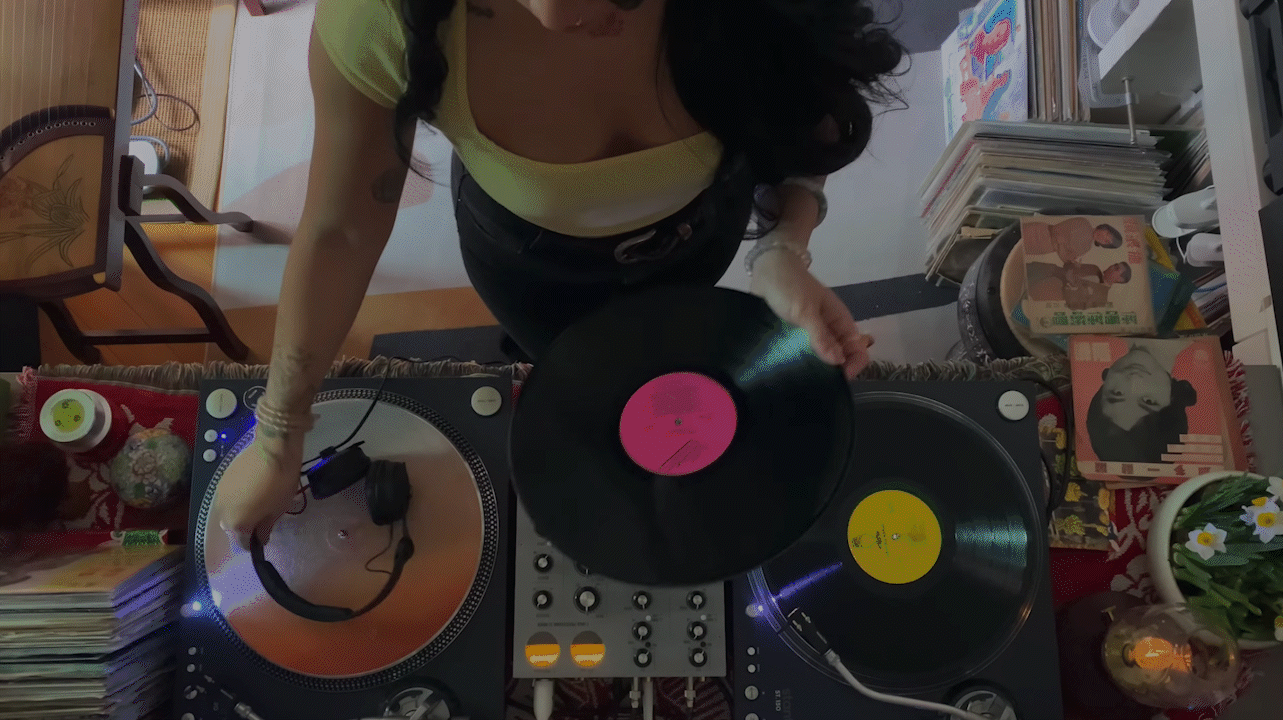
This conversation has been edited for length and clarity.
How did you get introduced to salsa, and when did you decide to pursue it as a career?
When I heard [salsa] for the first time, I knew I was hearing Spanish but I didn’t know anything outside of white, European Spanish culture. Hong Kong was a British Colony, so we were brought up kind of white washed. I began listening to all kinds of music in Spanish; reggaeton, salsa… but I didn’t know which genre was which.
One summer in high school, I went to a hostel in Greece where I met this Puerto Rican guy. On one super hot day this guy [asks], “Why is everybody inside? Let me teach you guys how to dance salsa.” That was the first time I learned that you can dance to salsa. Because of my dance background I could keep up, and he was like “How are you able to follow me?” We became really good friends, and when I was about to return to Hong Kong, he said to me, “You better not stop, you better keep practicing!” So I went back to Hong Kong and started looking for salsa lessons, but everywhere I went, they were teaching ballroom style salsa. I couldn’t find anything similar to what my friend had shown me. I started looking for and going to salsa parties. That’s how I met my mentor, Ralph, who is from Curaçao. I just wanted to know more.
So by that point you hadn’t yet thought of DJing, you were just listening to salsa and looking for parties?
Exactly. I was 19. Eventually, my mentor asked me if I wanted to [DJ] parties because not many people do that in Asia. I think 80% of the style in which I play now was influenced by him. So he started sharing his entire CD collection with me, and that’s when I began collecting music myself. Every day on my way to school I’d be listening to my mentor’s CDs, I’d probably listen to 20 CDs per day. When I began DJing parties, I started collecting records. I would hunt for albums in record stores when I couldn’t find them online. The first vinyl record I ever owned was by Groupo Baruc, a small group from New York. The arranger of this band is actually Marc Anthony’s producer.
After graduating high school, I didn’t know what I wanted to do. I eventually decided to study Hispanic Studies at University and wrote my thesis on Cuban cinema, but it was really so that I could write about the music. I traveled to Cuba a few times by myself because I couldn’t get in touch with this music and dance in Hong Kong. When I began DJing part time, I didn’t [get booked very much] because I felt that people were like, “she’s too young.”
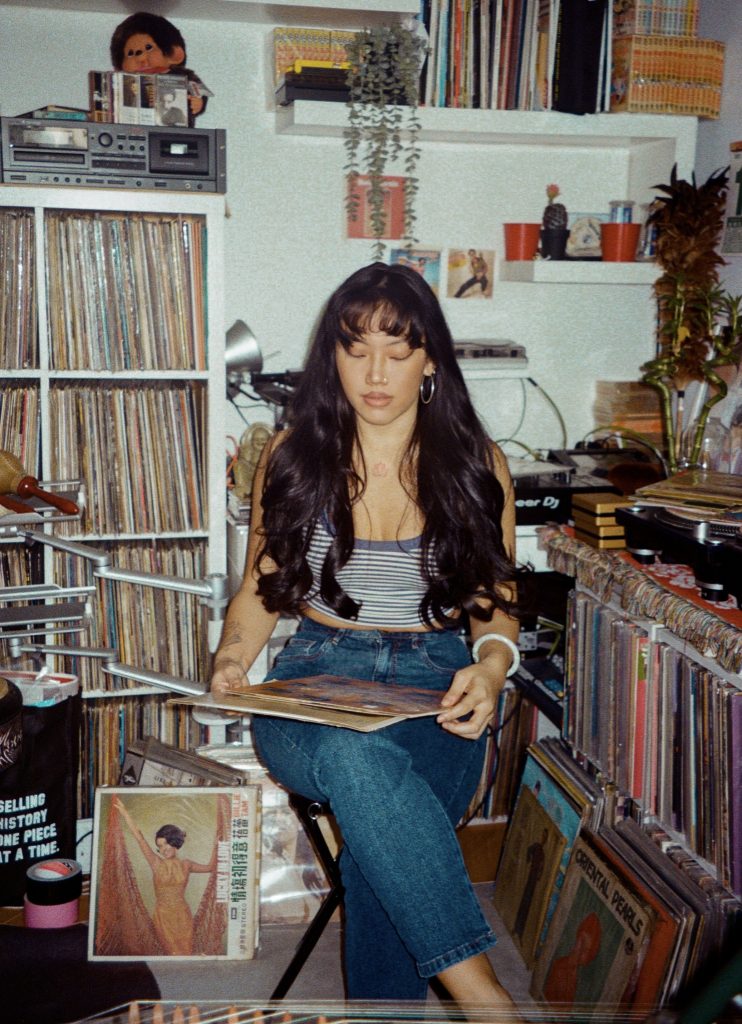
Gia in her home studio in Hong Kong. Image by Cindy Fu
I’m sure that feeling like an outsider would make you want to work ten times harder. How do you overcome that?
I think in general, especially in the party scene, you already know that the culture is going to be very machista. I feel more respected in the music scene than the dance scene because people now know my work. I think all “female DJs” — I hate this term by the way — experience this same thing. You still don’t see many female musicians or even singers in the salsa industry. I also know that I have an advantage on social media. If I only posted record covers, nobody would give a fuck about what I write. I know how to post a good photo and catch peoples’ attention, but the reality is that I’m mostly just in my studio studying and reading books. I make all these mixes on YouTube so that people know that it comes from my time spent researching. That’s why I want to do a degree, and now I’m producing and composing. People still write all kinds of comments online though.
What kind of comments do you get on Instagram?
When I do [Instagram live], the two most frequent comments I receive are “Asian girl playing salsa, sooo interesting”, and “I thought she was going to mix, what kind of DJing is this?” So sometimes I’ll do a poll on Instagram [asking]: “Why do you think the majority of salsa DJs don’t mix?”
And why don’t you mix?
Modern recordings are made with an electronic metronome that keeps the beat perfectly, but they didn’t use that in the 70s or 60s. Back then it was just jamming, they didn’t care about being exactly on the beat and the dancers would dance to anything. That’s how they would come up with the crazy percussion and piano solos, etc. Each song is telling a story, you can’t just cut the story, for example in “Pedro Navaja” by Ruben Blades or “Anacaona” by Cheo Feliciano. In salsa, there’s a part in the middle of the song where the singer improvises called soneo. I learned by playing for dancers, that if you mix at any dance party — it doesn’t matter if it’s Asian dancers or Latino dancers — they will kill you! So when I’m DJing, I wouldn’t want to mix that song because that’s where it gets hot. I’m a purist. In salsa, it just doesn’t make sense. It only really works in a club setting.
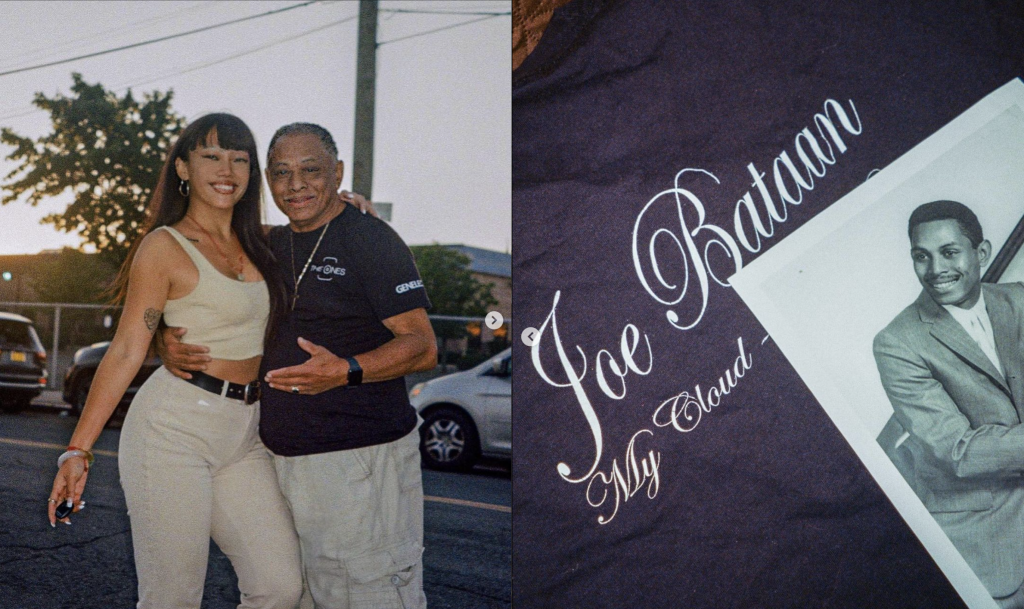
“Sometimes I feel adrift as someone from Asia trying to set foot in a world that is yet still new to me. Meeting legends like Joe totally opens up my mind and sets my goals even clearer, all the guidances and experiences he has given and taught me in just a short period of time is gold to me. Thank you. I will always be grateful for this day.” via Gia’s Instagram @_giafu
You’ve spent time with all kinds of salsa legends like Joe Bataan and Gilberto Colón Jr. Last year, you released an album that you produced with Angel Meléndez and Big Band Máquina. Tell me about how this collaboration came about, and how you were able to make an album with musicians in Puerto Rico while living halfway around the world.
I want to contribute more to the scene by finding a way to get more of the younger generation engaged with this music. I had been finding all these old records that were recorded in really poor quality, and I thought that if they could be arranged with better equipment and in a big band style – 15-20 musicians- like the palladium mambos of the 60s, they would be so good. One day I was looking for this song that Angel made about 20 years ago, and my mentor offered to connect us. So we did a Zoom call, and initially I just wanted to buy the song from him, but we ended up talking about what we’re both working on. Eighteen years ago, Angel was nominated for a Grammy for a big band salsa album he made. I told him about the low-quality records I had discovered, and he said to me “if you want, I can rearrange these songs.” I was like, “ok, let’s do it!” We sort of decided to do it as big as we could, the best way we could, so we decided to bring on 20 musicians.
“Whatever I’m doing in the salsa music world, I’m aware that it’s not my culture. That’s why I want to work one hundred times harder than others.”
Angel is also a music teacher on top of being a musician, so I learned so much by working with him. We’d go back and forth on FaceTime, me in Hong Kong and him in Chicago. I’d sing something and he’d play it back to me. That’s how we arranged the first two songs, but I was able to make it down to Puerto Rico for the second recording session in February 2021. I was meeting all of the musicians for the first time, some of them are big names in the salsa scene. When I first arrived at the studio, one of the musicians asked the music director, ‘So who is producing this album?’ and they pointed to me, the Chinese girl, and they were all in shock! But throughout the week, 14 hours a day in the studio, we all got to know each other and they eventually showed that they respected me.
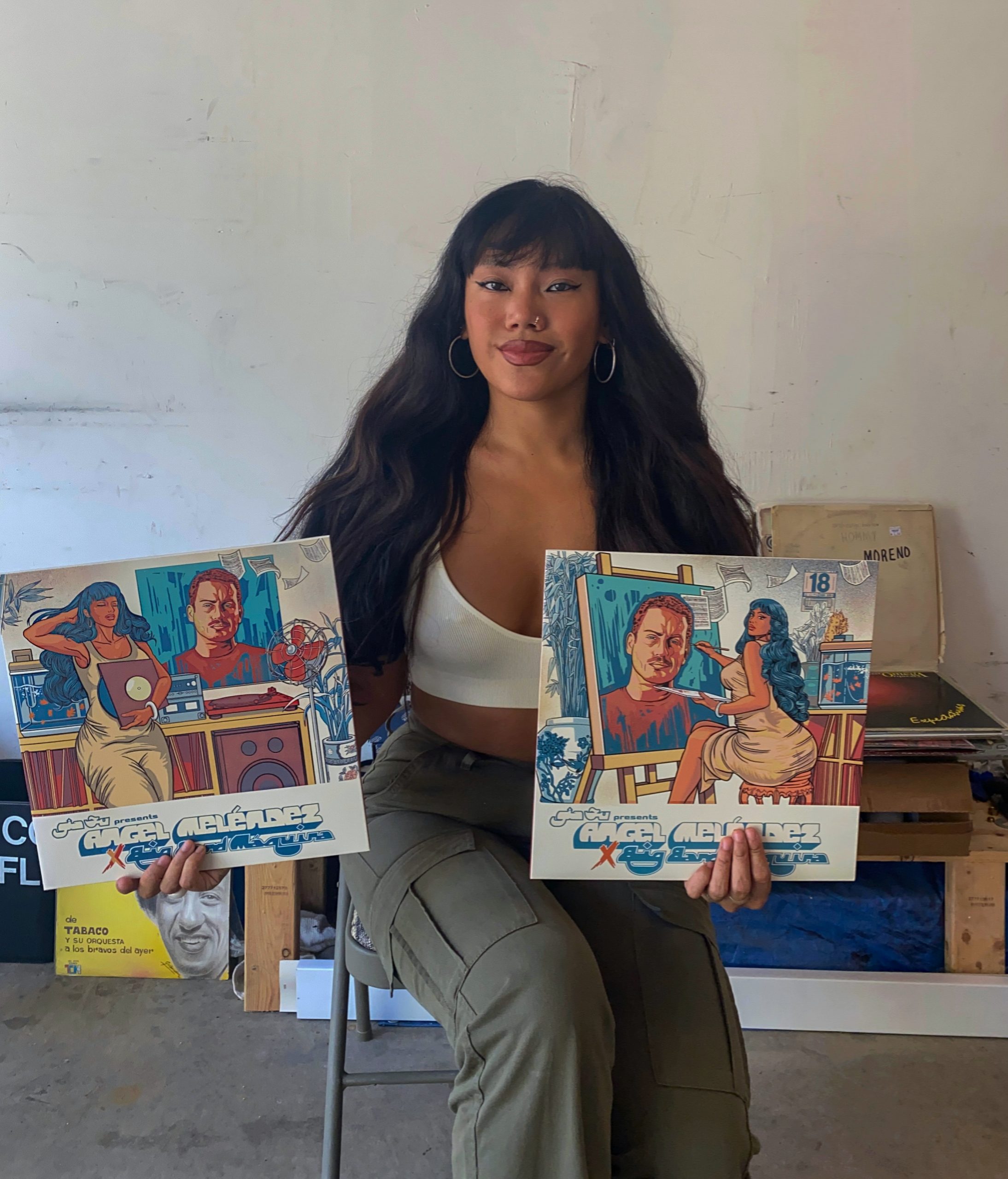
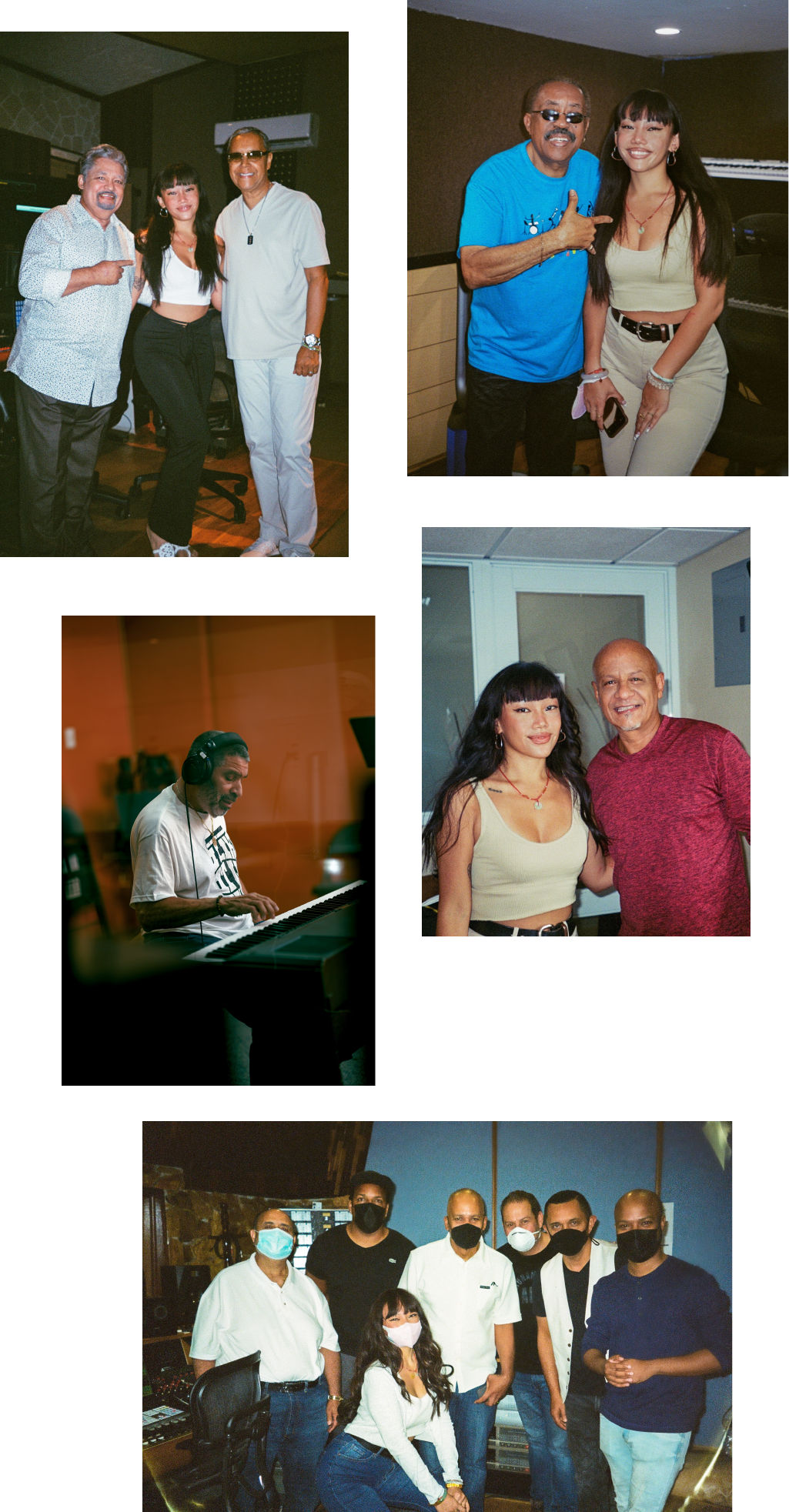
(From top left to right) Gia with singers Nino Segarra and Herman Olivera, Gia with Tito Allen, Gilberto Pulpo Colon Jr rehearsing on the keyboard, Gia with Rico Walker, Gia with members of the band during a recording session of Gia Fu Presents: Angel Meléndez x Big Band Máquina in Puerto Rico, 2021. Images by Giova Gonzalez
When we released the album in September 2021, we did it digitally first. All the musicians on the record were also promoting it. Then in Colombia, Mexico, and New York, people started asking if there was a physical copy. Then one of the oldest record stores in NYC, Casa Latina, contacted me about the album. Tito Allen, who sang with Ray Baretto, lives around that area and he went to the store and told the guy that they needed to get the CD because [he was] on it. We were finally able to press a small run of 300 records and we sold out in three days.
Last year was a big year for you, with the album release and then getting signed to Marc Anthony’s Talent Agency Magnus Media. How did that relationship come about?
I got booked to play a private party during Latin Billboard week, and afterwards they booked me for one of Marc’s parties during the Latin Grammys. I was in a room with Romeo Santos, Karol G, Becky G, Luis Fonsi, so many people, but I’m so shy that I didn’t even look at them. I really wanted to focus and play a good set. After that gig, Magnus said they wanted to sign me. They said they had never met someone who knows salsa so well. I guess they also saw my potential.
What do you hope to come out of working with Magnus?
I don’t have a set plan for myself, I just do. I really do [all of this] for the love of salsa, I know that sounds so cheesy. I’ve just been doing what I like, and although it’s just the beginning, it’s gotten me to where I am now.
I would love to play more international gigs, a lot of international music festivals nowadays are heavily electronic focused. I’m hoping to one day curate a salsa-focused stage.
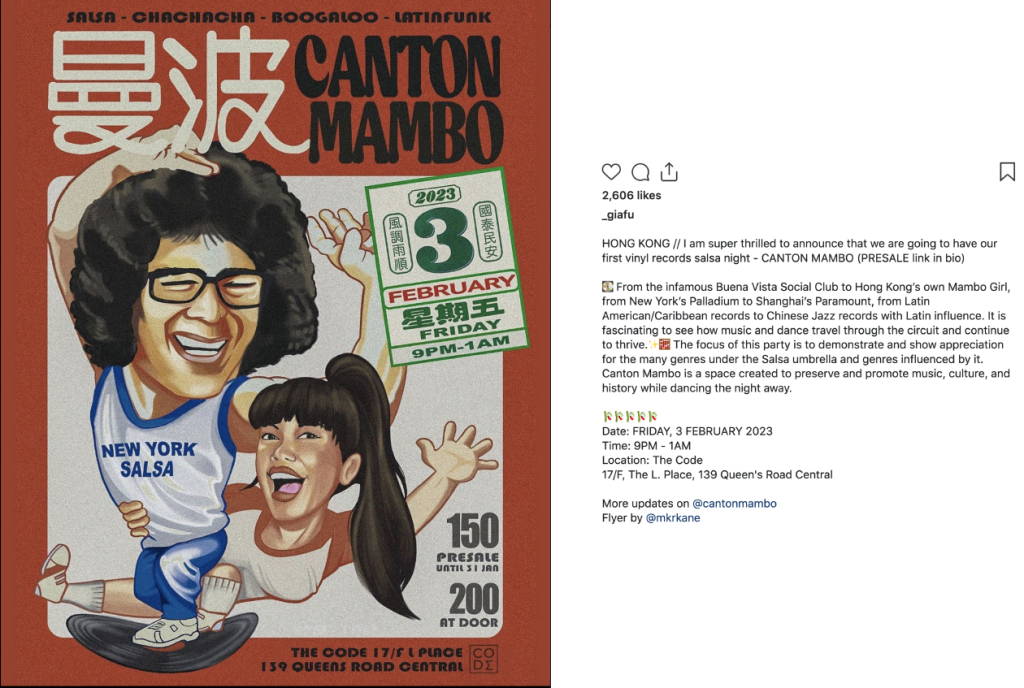
You recently threw a “Canton Mambo” party in Hong Kong. It seems like that party was a manifestation of your “CANTON CHÁ” playlist on SoundCloud. Do you plan to continue throwing parties in HK?
I decided to throw the party that I always wanted to go to in Hong Kong so that when people ask me how the salsa scene is here, I could [tell them].
The name “Canton” comes from the Canton Region where Hong Kong is. I’m working on a song called “Canton Mambo,” so this [party] was the beginning of a series that I want to do. I’m planning to do one in New York right now with my DJ friend who’s an oral history preservationist in Chinatown. She mainly plays Chinese records and collects records that people in Chinatown don’t want anymore. She brings the Chinese records and I bring the Latin side. And there’s a Cuban DJ in New York that I know as well, so we’re seeing what we can come up with for a party in NYC.
Cha-cha-cha, mambo, and salsa were the pop music of their era. How come [they are] stuck in the past and something that just our parents listen to? I want to change the perception of how people think about all this music. And back home, I want people to see that ballroom dance isn’t the only way to dance salsa, it’s supposed to be inclusive and social.
Would you say you’re trying to reinvent the social dance in Hong Kong?
I would say I’m trying to introduce a different concept of salsa music to people. You don’t have to know how to dance to come to my parties, you can just come and enjoy the music. At the Canto Mambo party, I started off with records from the 50s, but then moved into playing a lot of salsa, bachata, boogaloo and Latin funk which is completely new for this community. I want people to know that there is so much more [to learn about] Latin culture.
New York is the hub for salsa dancing and where salsa was popularized. That’s where I can [throw parties] right because you get different crowds. You get people who love the music, the general Latino crowd, and you get dancers. That’s what we’re missing in Hong Kong.
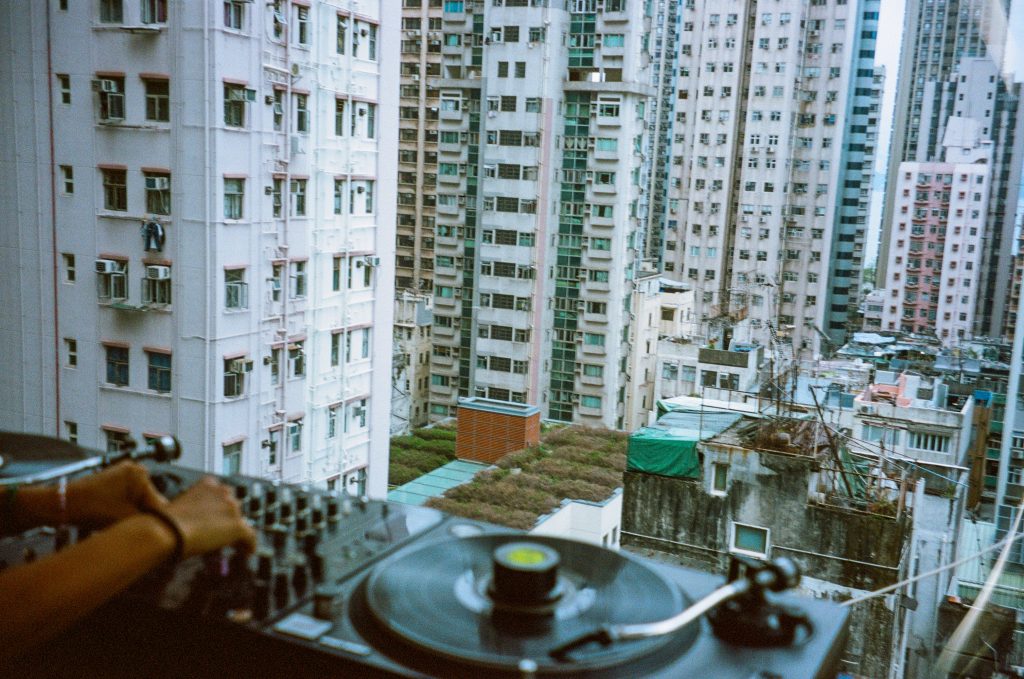
View from a vinyl party on Hong Kong Island
After years of studying Latin music and its cultural and historical contexts, what would you say is one of its more lasting impacts on you?
Salsa music is what makes me think that I know what love is. With salsa music, you can feel all kinds of emotions, the romance, lust, struggles and sadness. My friends ask why I’m still doing this after over 10 years. The more I know about the history of the music and the social contexts, the more connected I feel and the more I appreciate it. Of course I got into salsa because I thought the music and language was so romantic. But the more you get into the music, you realize they were expressing their life stories, their struggles, their passion for life in the only way they knew how at that time, and you can feel that all in the music. That’s how the music is so good.
Whatever I’m doing in the salsa music world, I’m aware that it’s not my culture. That’s why I want to work one hundred times harder than others. For the past ten years, 99% of what I listen to has been salsa. I don’t want to forget my roots and dive into Latin culture as if it’s my own; I know that it doesn’t belong to me. That’s why I’m doing these Canton Cha sets and parties, to bring these two cultures together.
Right now, I’m writing this descarga (an instrumental jam session) inspired by a Chinese tune that I used to dance to when I was six. I’m going to experiment with playing a Chinese instrument in [the song]. I study, I read a lot, and I want people to know that I really want to do this in the right way, respecting salsa and appreciating it as an art.
Gabriella Aguirre is a writer, filmmaker, ceramicist, and Editor of LATINA.











